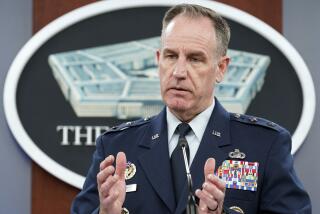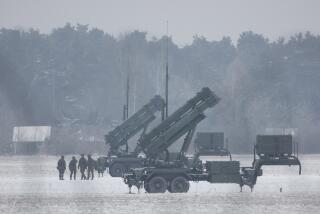Funds Diverted to Contras Overstated, Officials Say
- Share via
WASHINGTON — Congressional investigators have concluded that millions of dollars from the Reagan Administration’s secret arms sales to Iran were diverted to aid Nicaraguan rebels, but far less than the $30 million initially estimated, officials familiar with the inquiry said Thursday.
The chairman of the Senate committee investigating the scandal, Sen. Daniel K. Inouye (D-Hawaii), told reporters that most of the “money trail” from the arms sales has now been traced.
“I don’t think we’ll ever be able to relate to the people of the United States the complete money trail,” Inouye said. “But on a scale of one to 10, we’ve got nine.”
Meese’s Discovery
Atty. Gen. Edwin Meese III, whose aides first discovered evidence of the diversion last year, said last Nov. 25 that up to $30 million from the arms sales may have gone to the contras . Congressional investigators say they now believe the diversion involved “well under” $30 million but refused to be more precise. Other officials said Senate and House investigators have accounted for most of an estimated $20 million in profits that flowed from the secret weapons sales in 1985 and 1986.
“We are now confident that we know where the money went,” a Senate aide said.
Much of the money paid for a secret operation, directed by then-White House aide Oliver L. North, to ship arms to the Nicaraguan contras during the time when Congress banned U.S. aid to the rebel cause, they said.
Money for Middlemen
But a good deal of the money also went to middlemen in the various arms deals, they said.
Inouye, other members of the House and Senate committees and their aides all refused to divulge details of their findings, saying the facts will be laid out in public hearings scheduled to begin May 5.
“There are some small surprises,” one source said, “but you’ll have to wait for the hearings.”
A key break in the investigation, officials said, came earlier this week when investigators interviewed Albert A. Hakim, the secret arms network’s financial manager, in Paris. Hakim, who was granted limited immunity from prosecution in exchange for his testimony, turned over extensive financial records and “laid out the basic structure of the thing,” one source said.
Two members of the investigating committees, Sen. James A. McClure (R-Ida.) and Rep. Dick Cheney (R-Wyo.), participated in the interview with Hakim, aides said. Hakim is expected to testify publicly in Washington next month, they said.
Secord May Testify
Inouye said another key figure in the case, retired Air Force Maj. Gen. Richard V. Secord, may agree to testify at the hearings without a grant of immunity from prosecution. Secord was the top manager of the arms network outside the White House.
Secord, along with North and former National Security Adviser John M. Poindexter, had earlier refused to speak before congressional committees, citing the Fifth Amendment as protection against being compelled to give possibly self-incriminating testimony.
The committees have voted to give Poindexter limited immunity, meaning that his testimony in Congress cannot be used against him in criminal prosecution, and have not yet decided whether to do the same for North. Nor have they offered immunity to Secord.
Inouye said committee lawyers have been negotiating with Secord’s attorney. “It is possible he will testify voluntarily,” Inouye said.
Belief in Innocence
Asked why Secord might agree to appear without immunity, Inouye replied: “I’m certain he feels he has done nothing wrong.”
Inouye spoke with reporters after a closed-door meeting in which members of the Senate committee voted limited immunity from prosecution in order to compel the testimony of two more witnesses.
Inouye described the two as “very minor figures.” A committee source also refused to identify them but noted: “We’ve got secretaries and clerks taking the Fifth Amendment.”
More to Read
Get the L.A. Times Politics newsletter
Deeply reported insights into legislation, politics and policy from Sacramento, Washington and beyond. In your inbox twice per week.
You may occasionally receive promotional content from the Los Angeles Times.











